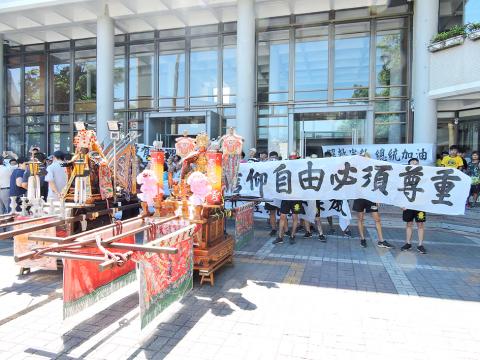Due to controversy over a draft religious basic act, the Legislative Yuan’s Internal Administration Committee decided to cancel a scheduled review scheduled for yesterday.
The draft act was sponsored by Chinese Nationalist Party (KMT) legislators Wang Jin-pyng (王金平), Huang Chao-shun (黃昭順) and Ma Wen-chun (馬文君), as well as Democratic Progressive Party (DPP) Legislator Lin Tai-hua (林岱樺), and cosigned by more than 30 legislators across party lines.
Article 10 of the bill would have established a principle of separation of religion and secularism, and forbidden the governing authorities from interfering in religious affairs.

Photo: Chang Tsun-wei, Taipei Times
The same article would have prevented the courts from mediating religious affairs, or interfering with the organizing of religious groups and the appointing of group personnel.
Article 13 would have prevented the government from restricting or prohibiting religious activities and would have given religious groups autonomy in terms of their organizational structure, personnel and financial management.
Most importantly, it would have made religious groups exempt from the Civil Code and the oversight of agencies that supervise charity groups and foundations, as well as prohibiting the government from making religious groups conform to the principles of democracy and transparency.
Article 14 proposed that religious groups be exempt from upholding the prohibition against religious discrimination in the Employment Service Act (就業服務法).
Article 15 would have given parents and legal guardians the right to choose a religion for minors.
Article 27 would have given religious groups with a building on government-owned land that had been in use for more than five years prior to the bill’s enactment the ability to apply to purchase the land.
The DPP caucus yesterday expressed its opposition to the draft.
Several DPP legislators who had originally supported the draft had already withdrawn their cosponsorship, DPP caucus convener Ker Chien-ming (柯建銘) said.
Wang has withdrawn as a bill sponsor.
The DPP caucus hoped that society would be given the opportunity to form a consensus on the regulation of religious groups, and did not want to conduct a hasty review, Ker said.
The caucus did not want to see religious groups smeared due to the chaos surrounding the bill’s review, he said.
The draft does not give an advantage to any group or individual, Huang said, adding that she was disappointed that some legislators accused religious groups of becoming involved with Chinese money-laundering groups as part of Beijing’s “united front” tactics.
The review was canceled so that religion would not become politicized and tainted in Taiwan, she said.
As several articles in the bill are controversial, the Ministry of the Interior is not voicing an opinion, the ministry’s Department of Civil Affairs Director Lin Ching-chi (林清淇) said.
Lin said there was no need for a basic religious act, because the Constitution already guarantees religious freedom.
The DPP and the New Power Party caucuses have proposed to return the draft to the Legislative Yuan’s plenary session for further deliberation.
Deputy Legislative Speaker Tsai Chi-chang (蔡其昌) said a new date should be set to deal with the act.

Tropical Storm Gaemi strengthened into a typhoon at 2pm yesterday, and could make landfall in Yilan County tomorrow, the Central Weather Administration (CWA) said yesterday. The agency was scheduled to issue a sea warning at 11:30pm yesterday, and could issue a land warning later today. Gaemi was moving north-northwest at 4kph, carrying maximum sustained winds near its center of up to 118.8kph and gusts of 154.8kph. The circumference is forecast to reach eastern Taiwan tomorrow morning, with the center making landfall in Yilan County later that night before departing from the north coast, CWA weather forecaster Kuan Shin-ping (官欣平) said yesterday. Uncertainty remains and

SEA WARNING LIKELY: The storm, named Gaemi, could become a moderate typhoon on Wednesday or Thursday, with the Taipei City Government preparing for flooding A tropical depression east of the Philippines developed into a tropical storm named Gaemi at 2pm yesterday, and was moving toward eastern Taiwan, the Central Weather Administration (CWA) said. Gaemi could begin to affect Taiwan proper on Tuesday, lasting until Friday, and could develop into a moderate typhoon on Wednesday or Thursday, it said. A sea warning for Gaemi could be issued as early as Tuesday morning, it added. Gaemi, the third tropical storm in the Pacific Ocean this typhoon season, is projected to begin moving northwest today, and be closest to Taiwan on Wednesday or Thursday, the agency said. Today, there would likely

DISRUPTIONS: The high-speed rail is to operate as normal, while several airlines either canceled flights or announced early departures or late arrivals Schools and offices in 15 cities and counties are to be closed today due to Typhoon Gaemi, local governments announced last night. The 15 are: Taipei, New Taipei City, Taoyuan, Tainan, Keelung, Hsinchu and Kaohsiung, as well as Yilan, Hualien, Hsinchu, Miaoli, Chiayi, Pingtung, Penghu and Lienchiang counties. People should brace for torrential rainfall brought by the storm, with its center forecast to make landfall on the east coast between tonight and tomorrow morning, the Central Weather Administration (CWA) said. The agency issued a sea warning for the typhoon at 11:30pm on Monday, followed by a land warning at 11:30am yesterday. As of

CASUALTY: A 70-year-old woman was killed by a falling tree in Kaohsiung as the premier warned all government agencies to remain on high alert for the next 24 hours Schools and offices nationwide are to be closed for a second day today as Typhoon Gaemi crosses over the nation, bringing torrential rain and whipping winds. Gaemi was forecast to make landfall late last night. From Tuesday night, its outer band brought substantial rainfall and strong winds to the nation. As of 6:15pm last night, the typhoon’s center was 20km southeast of Hualien County, Central Weather Administration (CWA) data showed. It was moving at 19kph and had a radius of 250km. As of 3pm yesterday, one woman had died, while 58 people were injured, the Central Emergency Operation Center said. The 70-year-old